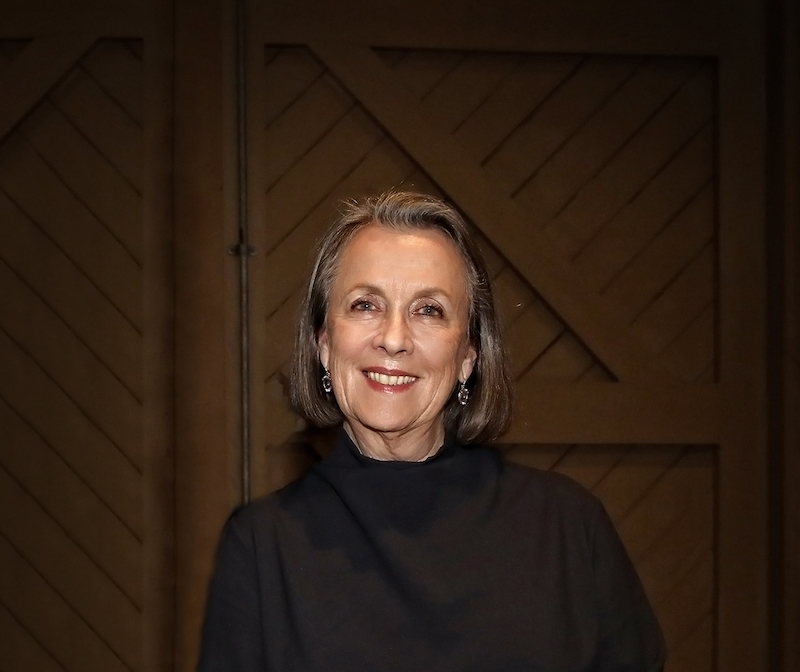Vale Chrissy Sharp: A tribute by Ian David
14 December, 2021
VALE CHRISSY SHARP
(1951 - 2021)

Chrissy Sharp, a cherished and highly respected past Executive Director of the Australian Writers’ Guild, died on November 2. The Guild extends its deepest sympathies to Chrissy’s husband, Michael Sharp, her two sons, Christopher and Edward, Michael’s daughter Ella, and their respective families.
Arts organisations in this country and beyond will remember Chrissy as someone who was an inspirational, devoted and visionary advocate for the arts. As an administrator, she was without peer. Her curriculum vitae includes General Manager of Sydney Festival from 2001 to 2003; General Manager of Sadler’s Wells in London from 2004 to 2009; Founding Director and CEO of The Wheeler Centre from 2009 to 2011; and Chief Executive Officer of the Sydney Writers’ Festival from 2018 to 2021.
Before all those significant achievements, Chrissy played an absolutely critical role in establishing the modern structure and direction of the Australian Writers’ Guild. The 1990s was a time when the Australian film and television industry was busy dealing with new technologies and markets. As money and reputations were being ploughed into the new ‘avocado plantation’, Chrissy joined the Australian Writers’ Guild, Australia’s peak industry body for performance writers, promoting and protecting Australian cultural voices within the arts.
Chrissy grew up in Canberra in a household devoted to creative endeavour. Her parents, Ted and Irene Hannan, encouraged her to pursue issues of equity and fairness, while developing a deep and abiding interest in the arts. She fought tooth and nail for the organisations she led, never claiming the limelight. For her, the arts defined society’s intellectual quality, ethnic richness and moral values.
Chrissy was always direct - not rude, never gauche, while being very clear about her desired outcomes. She did her homework, she knew what she was talking about. She told you things you needed to know even if you didn’t want to know them. It’s not that she didn’t suffer fools easily. She just didn’t suffer them. She was highly intelligent, incisive, well-prepared and always articulate. If she wasn’t confident she didn’t show it. However, that didn’t translate into hubris, she was no show pony. She worked throughout her life to maintain a caring and enlightened artistic community, elevating its standards, making its cultural riches more accessible.
Chrissy hated humbug and cant. Hypocrisy offended her deeply, especially from an adversay who negotiated in poor faith. She was driven by rights over privilege. What was fair was immensely important to her. In matters such as racism, sexism and abuses of power, she never backed off. She was an activist. She would take her place at the barricades, doing so with Actors Equity and the Australian Writers’ Guild, amongst others. Chrissy Sharp knew sustained knowledge and controlled power were very effective weapons in the struggle for a fairer deal for those working in the arts.
Continuing the Guild’s preference for engaging strong, independent women for the top job, Chrissy oversaw running of the Guild from 1992 to 1995, following in the footsteps of inspiring leaders such as Angela Wales and Janette Paramour.
Chrissy’s three years at the helm were potent and timely. Her achievements included overseeing the development of the first model for Australia’s Theatre Industry Agreement which still stands today as the basis of all theatre agreements with Australian stage writers. She engineered the expansion of the Guild, nationwide - by the time Chrissy left the Guild, it was the only organisation representing artists which had offices around the country.
However, in the minds of many Guild members, Chrissy most significant contribution was to take the representation of Australian performance writers to the world. In so doing, the Guild negotiated successfully with international writers guilds at a time when technologies and platforms were in robust transition.
Occupying a place on the international stage, the Guild was introduced to European institutions involved in collecting royalties on behalf of artists. Immediately recognising the benefits for all Guild members, Chrissy encouraged the acquisition of knowledge and expertise from sister organisations familiar with collecting societies. She was responsible for involving legal expertise in the establishment of the Australian Writers’ Guild Collecting Society which works on behalf of performance writers in the distribution of royalties. The incomes and rights of Australian performance writers were significantly improved under her watch. These were no mean achievements and remain as proof of her considerable legacy.
Anyone glancing at Chrissy’s work history will immediately notice she never let the grass grow under her feet. She was capable of gracing the highest office in arts organisations anywhere in the world. The Guild was fortunate in securing her formidable talents for three critical years. As with all the impressive names on her glittering curriculum vitae, we will always be immensely grateful.
By Ian David


